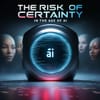As artificial intelligence (AI) becomes increasingly integrated into our lives, it's tempting to seek certainty in its predictions and decisions. However, this pursuit of certainty can be a double-edged sword. On one hand, AI's ability to analyze vast amounts of data and identify patterns can provide valuable insights and improve decision-making. On the other hand, relying too heavily on AI's certainty can lead to a lack of nuance and critical thinking.
AI systems are only as good as the data they're trained on, and biases or errors in the data can lead to flawed predictions. Moreover, AI's understanding of the world is limited to its programming and data, which can never fully capture the complexity of human experience.
Uncertainty is an inherent part of human decision-making, and it's essential to acknowledge and embrace it. By recognizing the limitations of AI and the uncertainty of outcomes, we can foster a more nuanced and critical approach to decision-making.
Rather than relying solely on AI's certainty, we should strive for a balanced approach that combines the benefits of AI with human judgment and critical thinking. By doing so, we can harness the power of AI while avoiding the pitfalls of certainty and ensuring more informed and thoughtful decision-making.
Ultimately, the age of AI requires us to rethink our relationship with certainty and uncertainty, embracing a more nuanced and adaptive approach to decision-making that acknowledges the strengths and limitations of both human and artificial intelligence.


